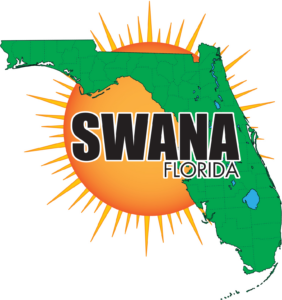Hinkley Center Solid Waste Research Colloquium Webinar Series
Dates
10/13/2020 - 10/21/2020
Location
No Physical Location
Zoom Webinars
Please see session descriptions, speaker information and registration links below.

The Webinar Series is now available On Demand.
Sponsored by

Research Topic: An Integrated Tool for Local Government to Track Materials Management and Progress Toward Sustainability Goals
Professor Townsend will discuss efforts to develop a tool for Florida regulators, local governments and the waste management community that will allow recycling rates and sustainable materials management metrics to be integrated.
Or download PowerPoint Presentation
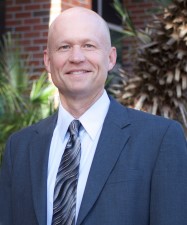 Dr. Timothy Townsend, University of Florida
Dr. Timothy Townsend, University of Florida
Timothy Townsend is a Professor in the Department of Environmental Engineering Sciences in the Engineering School for Sustainable Infrastructure and the Environment at the University of Florida. Dr. Townsend teaches and conducts research related to solid and hazardous waste management. His courses cover subjects such as waste management fundamentals, landfill design, recycling, construction and demolition debris, and waste management in developing countries. He has published many papers and research reports on topics related to bioreactor landfills, recycling, construction and demolition debris, waste leaching, beneficial use of solid wastes, and special wastes such as electronic scrap. His recent book is titled Sustainable Practices for Landfill Design and Operation.
Research Topic: Cost-Effective Hybrid Constructed Wetlands for Landfill Leachate Reclamation
Dr. Ergas will speak on her Hinkley Center funded project that investigates amending constructed wetland (CW) media with low cost adsorbents, zeolite, and biochar. These materials adsorb ammonia and recalcitrant organic compounds, reducing their toxicity to microbes and enhancing biological degradation. In side-by-side bench scale studies, bioreactors with zeolite and biochar achieved significantly higher removal of chemical oxygen demand (COD), color and ammonia removal than unamended control. Pilot scale hybrid CW systems with and without adsorbent addition are currently being operated at a landfill in Florida.
Or download PowerPoint Presentation
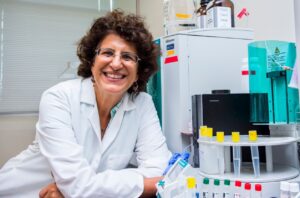 Dr. Sarina Ergas, University of South Florida
Dr. Sarina Ergas, University of South Florida
Dr. Sarina Ergas is a Professor and Graduate Program Director in the Department of Civil & Environmental Engineering at the University of South Florida, Tampa. She holds a BS in Environmental Engineering from Humboldt State University and MS and PhD degrees from the University of California, Davis. Her research focuses on environmental biological processes, including biological nutrient removal and waste-to-energy technologies. She is a fellow of the Association of Environmental Engineering and Science Professors (AEESP) and the Water Environment Federation (WEF). She is a licensed Professional Engineer and an AAEES Board Certified Environmental Engineer.
Research Topic: Compatibility Testing of Polymer-Modified Bentonite GCLs
Dr. Abichou will report on recent research, funded by the Hinkley Center, on the use of geosynthetic clay liners (GCLs) in landfill lining systems. In particular, he will present summaries of their findings on the long-term hydraulic conductivity of polymer-modified bentonite GCLs with MSW-I ash leachates as well as the factors influencing polymer elution and the mechanisms controlling chemical compatibility of a polymer-modified bentonite GCL containing linear polymers. The presentation will then conclude with new recommendations on assessing the compatibility testing of polymer-modified bentonite GCLs.
Or download PowerPoint Presentation
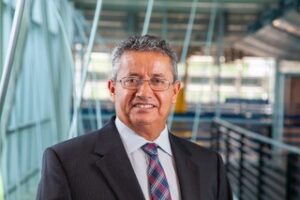 Dr. Tarek Abichou, Florida State University
Dr. Tarek Abichou, Florida State University
Dr. Abichou is a Professor of Civil and Environmental Engineering, at Florida State University. Dr. Abichou received his MS and PhD form the University of Wisconsin in Madison. He is known for his research investigating the mitigation of greenhouse gas emissions from landfills using bio-oxidation of methane using Biocells, Biocovers, and Biofilters. His research group developed a model to inventory fugitive emissions from landfills. He also has extensive experience in temporal and spatial characterization of methane emissions from landfills using static flux chambers, optical remote sensing, and tracer techniques.
Research Topic: Methods to Upgrade Landfill Gas to Fuel and Chemicals
Landfill gas has long been a by-product of landfill decomposition that has historically been managed by just flaring off the gas. Over the last several decades many projects have been developed to utilize the gas to produce electricity or to process it into a direct use or compressed natural gas for industry or vehicles. Dr. Kuhn will be presenting his team’s research into innovative methods of converting and upgrading landfill gas to other forms of useable fuel and chemicals, not currently being done, that can be utilized for operations or sold in the marketplace.
Or download PowerPoint Presentation
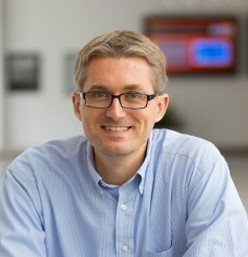 Dr. John Kuhn, University of South Florida
Dr. John Kuhn, University of South Florida
Professor John Kuhn is an Associate Professor and Associate Chair of Graduate Studies in the Department of Chemical and Biomedical Engineering at the University of South Florida. His recent research group focuses on waste-to-energy processes and operations, with an emphasis on process and operation performance improvements, benchmarking of process and operation performance metrics, and process intensification. His group has been funded by many agencies, including the Hinkley Center, NSF, DOE, NASA, FESC, and VentureWell.
Continuing Education Information:
State of Florida Operators and Professional Engineers – CEUs were only offered during the live webinars and are not available for viewing on-demand webinars.
SWANA – CEUs are available for viewing on-demand webinars. You may request CEUs by sending an email to certification@swana.org with the following webinar information: the timetable, program information, and proof of registration or completion.
About the Hinkley Center for Solid and Hazardous Waste Management
The Hinkley Center for Solid and Hazardous Waste Management is a statewide center that provides leadership in waste management research with the goal of preserving and protecting the state’s natural resources. The research program focuses on methods and strategies for managing solid and hazardous wastes. Research results are transferred to the public and private sectors for practical applications. Principal research areas include Construction & Demolition Debris, Electronic Waste, Hazardous Waste Management, Incineration, Landfills, Medical Waste Management, Municipal Solid Waste Management, Pollution Prevention, Recycling and Reuse, Socioeconomic Issues, Special Wastes, and Waste Reduction.
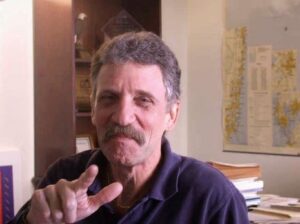 A little bit about Bill:
A little bit about Bill:
Bill Hinkley used to work in a boat yard in South Florida, scraping barnacles off the bottoms of boats. After he grew tired of scraping barnacles, he applied for a water quality sampling job at the Florida Department of Environmental Responsibility (DER) in their South Florida District Office. He rose through the ranks of the DER and served as Special Assistant to the Secretary of the DER who then transferred Bill into the Solid Waste Department. When Senator Kirkpatrick started on his solid waste bill in the 1980s, he met Bill Hinkley and immediately saw that Bill was a talented and sociable person. Senator Kirkpatrick recruited Bill to help him draft the 1988 Solid Waste Act, which ultimately changed the course of solid waste management in Florida.
Bill was also a proponent of conducting research on an issue before starting rule making. He was a huge supporter of the then Florida Center for Solid and Hazardous Waste Management. He loved his family very much and the small beach cottage that his family built on Saint George Island called “Island Baby”. He built his own house on a land cooperative east of Tallahassee called the Micanopy Land Cooperative, a collection of five-acre lots with homes of a wide variety of designs. He loved to sail and meet people.
When Senator Kirkpatrick’s legislative aide, Mike Murtha, learned that Bill had been diagnosed with a form of cancer that is always fatal, Mike immediately drafted a bill to change the name of the Center to honor Mr. Bill Hinkley. Bill learned of this shortly before his death and said that he was very humbled by the Legislature’s action. When Bill was asked about what he wanted in terms of a service after his death, he said that he wanted a lot of people enjoying music, dancing, food, wine, beer, fireworks and having a lot of fun. We hope that the Colloquium will stay true to the spirit of innovation and fun that defined Bill Hinkley.

